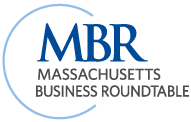The MA Business Roundtable Goes to DC!
If we want to stay competitive, should we talk candidly about state challenges and opportunities with business groups across the country? Absolutely. While we may compete with states across the country to position Massachusetts as a top innovative leader, we also know that states must work collaboratively to support regional, national, and global competitiveness.
This was top of mind as Lauren and I traveled to Washington DC at the end of April, convening state business roundtables for the first gathering since 2019 due to the pandemic. Annually, the Massachusetts Business Roundtable helps to bring together executives leading their respective business group to share experiences from each organization and state while also hearing from national experts on key economic issues. The national Business Roundtable (BRT) once again hosted our group, which this year included twenty roundtables from across the country.
A conversation with US Secretary of Labor Marty Walsh was a major highlight of the agenda with workforce development top of mind to all business roundtables. The agenda also featured presentations on US competitiveness from the US Department of Commerce, federal policy updates with key staff from BRT, an overview and discussion on the current political landscape with pundit Bruce Mehlman, and an open forum among business roundtables. States represented included Arizona, California, Florida, Hawaii, Illinois, Iowa, Kansas, Louisiana, Maryland, Massachusetts, Michigan, Minnesota, Ohio, Oregon, Pennsylvania, Tennessee, Texas, Washington as well as the District of Columbia.
Three themes emerged from this day-long summit, each of which bear watching nationally in the months ahead:
1. Workforce and talent development issues remain top priority: Business roundtables across the country unanimously expressed workforce challenges to be a major issue facing states nationwide. In fact, “workforce, workforce, and workforce” were described as the top three issues from one state business roundtable. Employers are struggling to attract, retain, and develop talent as they also navigate new work environments and the future of work.
Nationally, the BRT has established a new initiative to provide a forum for its members to share successful strategies including ways to implement apprenticeship models, diversify workforce pipelines, and strengthen private sector initiatives to invest in workers. The conversation provided reassurance that we in Massachusetts have established a good, working agenda to attract, retain, develop, and diversify talent. Now, we need to move towards greater action and implementation for strategies cited in the Massachusetts Business Roundtable’s Talent Agenda to Drive Massachusetts’ Competitiveness.
2. Innovation and Competition: Passage of the United States Innovation and Competition Act – (USICA)/the America COMPETES Act – was consistently raised throughout the day-long agenda, with a particular focus on provisions to encourage the production of microchips and semiconductors in the United States. This federal legislation proposes to address increased competition from China and has been identified as a priority by the Biden Administration with bipartisan support–though there are differences that need to be resolved. The BRT also supports the legislation, calling for states to help advance it by engaging with their respective congressional delegations.
In Massachusetts, the New England Council is leading this advocacy effort to highlight top priorities shared among employers in the region that will boost US competitiveness and innovation. As a bipartisan, bicameral Conference Committee begins negotiations to reconcile House and Senate versions of this legislation, the New England Council has advocated for this sweeping legislation. Learn more from the New England Council.
3. Changing nature of the relationship between corporations and government: Regardless of political party, many state business roundtables are experiencing business “on a small and shrinking political island in this country.” As major employers choose to advocate for social justice and inclusion issues deemed important to company leadership, employees, and customers, corporations are also experiencing the divisiveness that continues to grow in all regions of the country. Most recent and notable is Disney’s public opposition to legislation proposed in Florida, which subsequently led to the repeal of tax advantages for Disney by the Florida state legislature. But the Florida business community is not alone; other roundtables shared similar examples that their members have experienced when grappling with racial and social justice efforts in other states and nationally.
As we prepare for the 2022 mid-term elections and likely changes in Congress as well as some state and local elections, this trend may only continue and force employers to think carefully as they seek to balance how to engage on social issues without compromising business priorities in government.
For Massachusetts, we continue to find engagement with the national BRT and other state business roundtables as an important peer network and invaluable resource as we explore the impact of federal and national issues and trends within the business community locally. Thank you to the Massachusetts Business Roundtable’s Board of Directors for supporting our continued engagement with this network.
If any Massachusetts Business Roundtable member is interested in connecting with peer business roundtables or the BRT, please contact me at jdchesloff@maroundtable.com. While we plan to reconvene in-person for a fall summit, we stay in regular communication throughout the year and will especially stay engaged in the days and months ahead as we monitor the issues listed above and act accordingly.
RECENT POSTS
- Quarterly Policy Roundup: Q1 2024
- Black History Month: Reflections from Roundtable Staff
- Roundtable Members Discuss Impact of Business on Society
- Quarterly Policy Roundup: Q3 2023
- What We Heard This Summer in Our Roundtable Member Meetings
- Health Equity in Massachusetts and Why it Matters
- Growing MA’s Labor Market: Why Immigrants Should be Part of the Solution
- Massachusetts’ Future of Energy
- Roundtable Members Share Reflections on Workforce Dynamics
- Quarterly Policy Roundup: Q1 2023
